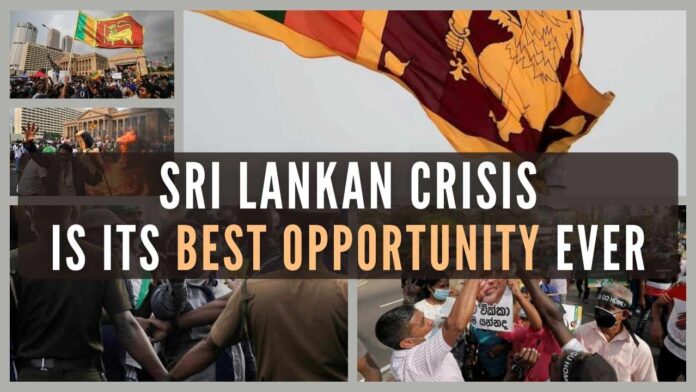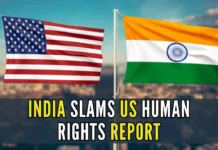
Turning crisis into opportunity: How to make good on big change
Sri Lanka is going through its worst ever economic, and political crisis.
“Never waste a crisis”, a saying goes. If a new, honest, competent and committed Sri Lankan leadership emerges, it can convert this crisis into its best opportunity ever. Just the way Lee Kuan Yew did in Singapore over half a century back. The purpose of this article is to explore how such a possibility can be made a reality.
Sri Lanka’s reasons for the crisis are being discussed and debated widely on public platforms: Highly corrupt dynastic political leadership, over-centralization of power, non-devolution of powers to states and local bodies, economic mismanagement including the drastic lowering of taxes, implementation of unviable high-value projects indiscriminately using high-cost loans, some at the behest of China, without even generating local employment to boot, faulty policies of organic farming without pilot studies or wider consultation, long unresolved ethnic conflicts, etc.
The short and even medium-term prospects of Sri Lanka are gloomy, and the question looms large as to how the present or any future government can turn around the situation and make the Sri Lankan economy sustainable.
But Sri Lanka has many intrinsic strengths, like a small population and size, strategic location vis a vis geo-politics, good climate, plentiful water availability, established tourism industry, good and growing private sector, esp its garment and tea industries, good placement on many of the WHO indicators, etc.
The next general elections will take some time because the priority of the interim government will be to retrieve the country from bankruptcy (with the assistance of the World Bank and friendly countries like India) and even mobilize money to conduct elections. How much of this will really happen remains a question mark.
In the meantime, honest, well-meaning, and competent Sri Lankans, who may not have been in politics, should take the initiative and work to convert the crisis into an opportunity, assuming the interim government will at least retrieve Sri Lanka from its state of bankruptcy.
It is usually very difficult to get together such a group. I believe, that if a set of popular Sri Lankan celebrities from all realms (esp some former cricketers who may have earned the respect of the people at large), known for integrity, are keen to set right the Sri Lankan politics and economics, they can take the initiative, start a new political party and seek to transform Sri Lanka. The right time is now.
While these celebrities may be popular and so people may trust them to some extent, they should understand their limitations. They should see themselves as facilitators of political change, not as ministers in the making. They should identify honest and competent public administrators, economists, policymakers, lawyers, engineers, businesspersons, chartered accountants, ex-judges, politicians (if any), etc, to be part of their party to run the administration if they come to power.
The new party should quickly formulate its objectives, policies, and road map to solve Sri Lanka’s problems and set a reasonable timeframe. Being relatively young, the core team is likely to understand how to use social media to take its plans and policies to the people.
There is an outstanding example in its neighbourhood, India, where a newly formed AAP party came to power in Delhi from nowhere, trouncing the well-established Congress and BJP, and much late, repeated its success recently in Punjab.
The parallels with AAP are striking. AAP was born out of the perception of high corruption in the Delhi state administration. AAP is comprised of mostly youth. AAP had very little financial resources and used social media to come to power. AAP’s leaders’ were mostly professionals from diverse backgrounds, but their political experience was almost zero. AAP had very little time, just about a year, to convince the people to vote for it before the elections. The new political party I’m envisaging for Sri Lanka is exactly in a similar situation.
AAP did many mistakes too, and the Sri Lankan political party should learn from these as well. For example, AAP promised many freebies, which is part of the current problem of the Sri Lankan crisis. I do not want to delve deeper into this subject to avoid presenting my subjective views about AAP as facts. After all, the solution for Sri Lanka can’t be the same as the solution for Delhi State (Union Territory, to be precise).
The party could even consider openly consulting some of the successful Indian political parties, like BJP, BJD, and AAP without necessarily subscribing to any of their ideologies.
The party should refrain from making promises which are difficult to fulfill, nor try to appease any sections of the society at the cost of others, and vow not to compromise on its goals and core principles. The purpose should not be merely winning the elections, but giving good governance if it wins. In fact, it can even be blunt and tell the people what to expect and what not to expect, honestly. It should be ready to lose if people are unwilling to support it.
If the core team is genuine in its intentions and is willing to look at this as an opportunity to give back to their nation in its time of need rather than as an opportunity for self-aggrandizement, this experiment should work.
All this is not going to be easy. But who said nation-building is easy?
Once Dr. Abdul Kalam was addressing youth. He told them, “I have a major project in mind and I’m looking for partners to work with me. Who among you are willing to be my partners?” Almost all raised their hands. He said, “the name of the project is nation building. I have a place for as many people as are willing. There is no competition.” This is the kind of inspiration the new party should invoke in Sri Lankans.
A few suggestions I had given for India through my articles may be relevant for Sri Lanka too. They are:
- How to prevent monopoly power of families in politics?[1]
- How to prevent political corruption significantly and help political parties raise money legally to run their parties?[2]
- How to use biogas systems to fulfill the cooking fuel requirements in rural areas and generate organic manure as byproduct.[3]
Since Sri Lanka is a small country, the chances that this experiment will succeed are good. It is important that this party is inclusive, and carries along all sections of the society based on the principles of liberty, equality, and fraternity.
If this experiment succeeds, this model can be an example for other democracies to emulate.
Note:
1. Text in Blue points to additional data on the topic.
2. The views expressed here are those of the author and do not necessarily represent or reflect the views of PGurus.
Reference:
[1] Time to end monopoly power of families in politics is now – Jul 14, 2022, PGurus.com
[2] One way to fix the systemic problems with corruption in democracy – Feb 23, 2022, PGurus.com
[3] How the Government Can Save Rs 10,000 Crore Per Year From Cow Dung – Jun 07, 2017, PGurus.com
PGurus is now on Telegram. Click here to join our channel and stay updated with all the latest news and views
For all the latest updates, download PGurus App.
- How BJP can get 33%+ vote share in TN - April 1, 2024
- A transparent, equitable electoral funding alternative - March 19, 2024
- How TN BJP can come to No. 1 or No. 2 in 2024 LS polls - January 11, 2024










